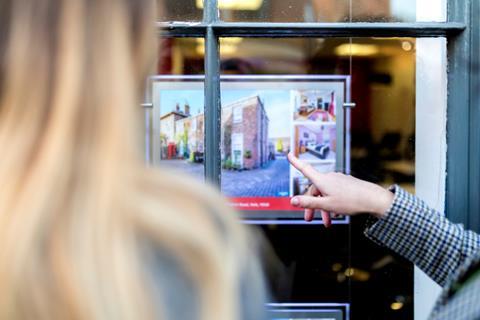Nationwide figures show market stuttering prior to withdrawal of hundreds of mortgages in recent days
House price growth stalled this month, according to new figures from the Nationwide �ڶ����� Society, which also show the annual rate of increase dipping below 10% for the first time in nearly a year.
The Nationwide House Price Index (HPI) for September, which has been published today (Friday), shows prices were unchanged over the month from August after taking account of seasonal effects, the first time this has happened since July 2021.
The non-seasonally adjusted average house price fell from £273,751 to £272,259, according to the index, which is based on post-survey mortgage approvals.

The figures come amid increasing fears over possible house price falls given the withdrawal of hundreds of mortgage products in recent days as lenders look to re-price their loans to take account of market turmoil.
The numbers from Nationwide, largely collected prior to the last week, show that annual house price growth slowed from 10% in August to 9.5% in September, the first single digit year on year figure recorded by the index since October 2021.
Robert Gardner, Nationwide’s chief economist, said that while the pace of annual increase remained “robust”, the market has seen further signs of a slowdown over the past month, such as surveyors reporting a decline in new buyer enquiries.
He said: “Nevertheless, the slowdown to date has been modest and, combined with a shortage of stock on the market, this has meant that price growth has remained firm.
“By lowering transaction costs, the reduction in stamp duty may provide some support to activity and prices, as will the strength of the labour market, assuming it persists, with the unemployment rate at its lowest level since the early 1970s.
“However, headwinds are growing stronger suggesting the market will slow further in the months ahead. High inflation is exerting significant pressure on household budgets with consumer confidence declining to all-time lows.”
Gardner also warned that housing affordability is becoming “more stretched” with a 10% deposit on a typical first-time buyer property equivalent to an “all-time high” figure of almost 60% of annual gross earnings.
He said: “Moreover, the significant increase in prices in recent years. together with the significant increase in mortgage rates since the start of the year have pushed the typical mortgage payment as a share of take-home pay well above the long-run average.”
Quarterly regional house price indices, also published by the Nationwide today, show most regions recording further price growth slowdowns. According to the data for the three months to September, annual house price growth softened in 10 of the UK’s 13 regions.
>> See also
>> See also
The South west remained the strongest performing region, even though it saw a slowing in annual house price growth to 12.5%, from 14.7% in the second quarter of this year. This was closely followed by the East midlands, where quarterly price growth picked up to 12.3%, from 11.4% in the previous three months.
Annual price growth slowed to 12.1%, 10.1% and 7.8% in Wales, Northern Ireland and Scotland respectively.
The publication of the latest Nationwide HPI follows a mass withdrawal by mortgage lenders of products earlier this week in the wake of the wider financial market turmoil triggered by chancellor of the exchequer Kwasi Kwarteng’s so called last Friday.
And property price portal Zoopla that reductions of asking prices are at their highest level since before the coronavirus pandemic.
Housebuilders have seen this week as the scale of the ructions in the mortgage market became apparent, with 41% of all UK mortgage products withdrawn as of yesterday, and many major lenders making loans much more expensive.
As of the close of play yesterday, shares in Barratt were more than 19% down on the level seen prior to the mini-budget statement, with Taylor Wimpey more than 15% down and Persimmon more than 10% down.
Responding to the Nationwide index, Tom Bill, head of UK residential research at Knight Frank, said: “We expect single digits to become negative digits next year given how far mortgage rates appear likely to climb. Everyone knew a normalisation was coming but the concern is that the government’s mini-Budget will lead to a steeper rate of increase and more financial pain for households.
“Given that the sums involved put the government’s entire economic plan in jeopardy, it feels like something has to give. The only thing that moves quickly in the housing market is sentiment and it has been damaged over the last week as mortgage products have been pulled.
“Whatever action the government takes, it feels almost inevitable that UK prices will fall next year and possibly into 2024. Prices have risen strongly over the course of the pandemic and for context, a 10% decline would only take us back to last summer.”
Guy Harrington, CEO of residential lender Glenhawk, said “The decade long house price growth party is over. If we do indeed see rates anywhere near the 6% that the markets are pricing in, the only outcome is a housing market crash.
“Only a rapid unwinding of rates when the true scale of consumer headwinds becomes apparent this winter will prevent a prolonged period of turmoil for homeowners.”


























No comments yet